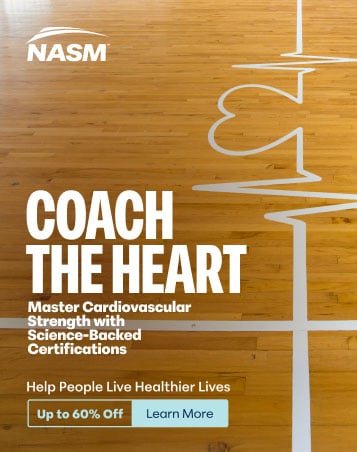Communication is the largest single factor that determines the quality of our relationships. As trainers, instructors, and other health professionals, our ability to communicate effectively will drive our careers' success.
Sometimes communication is simple, and it flows smoothly. Other times, it's complicated leading to uncomfortable situations that you could have avoided. But there are common barriers to effective communication that we all fall prey to and simple ways we can all strive to overcome them.
Here are five ways to help you overcome common barriers to effective communication. All of which are incredibly practical skills to learn as an NASM-CPT.
1. When you’re not sure what to say- Pause
You know how it is when you come up with the perfect thing to say long after a conversation is over?
That one witty or engaging antidote that would have made your conversation that much better? Or when you regret something you just said and wish you could hit the rewind button and take it back before it reached the other person’s ears? We've all been there before, and there’s no shame in it.
What I’ve learned, though, is that there’s a lot of power in a pause—just taking a quick break between what you heard and how you want to respond. You can take a deep breath or even count to three in your head, but the key is to process, think, then speak intentionally.
2. When you want to engage a person in conversation- avoid cliché openers
How are you doing? How’s everything going?
These are the questions people ask as they’re passing by, clearly not looking for a meaningful response. They're things we hear a million times on shows and said by strangers but not by those we genuinely want to communicate with. If we're going to engage a person in conversation, we have to be more original and authentic and avoid questions that require a one-word answer.
We have to express a genuine interest in the person and their interests and lives. “What’s your new puppy up to?” “How are your kids enjoying school?” Whatever question applies directly to their life and makes them feel valued, that’s what matters most. It's a simple way of making a human connection.
3. When you want conversational flow- Paraphrase
Sometimes we need clarification, and other times we just want to keep the conversation flowing.
A great way to accomplish just that is by paraphrasing. What is a paraphrase? It is just a simple reflection of what you heard the other person say. A person says, "Work has been challenging lately, and I'm struggling to stay motivated to exercise."
We might say, "It sounds like work is interfering with things you value." If we get it wrong, they can correct us. Don't repeat them verbatim but instead respond with your understanding of what they said. The idea is that meaningful conversation requires understanding- and we can build that through reflection.
4. When you’re upset- Adopt the 24-hour rule
When I taught stress management to university students, this was one of my favorite rules of engagement.
Let's say you get an email or text from a client or coworker, and it's not a good one. Rather than respond right away, formulate a response on a blank email (but don't send). In 24 hours, when your emotions are in check, you can determine then if it's safe to send or needs revising. With a live conversation, you can simply state, "Thank you, give me some time to think about this. I'll get back to you tomorrow."
5. When you want to give a genuine compliment- Start with Something Meaningful.
We often say things like, “good job,” or “you’re doing great.” But after a while, those compliments lose their impact. Instead, we can start with a phrase that captures their attention. “I don’t know if anyone has told you… but you're getting strong."
Or, “I wonder if you’ve noticed… but your posture is improving." You can choose any phrase that feels natural. I guarantee your clients will notice, and your words will hold more meaning.
So the next time you're feeling overwhelmed while communicating to anyone in your life, just remember these five tips and start to build the foundation for more effective conversations.
















